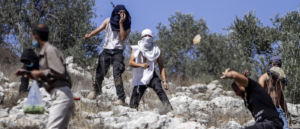- About Us
- Policy Center
- Learn
- Press Room
- Blog
- Get Involved
- Donate
- Donate to J Street Online
- Make a Gift in Someone’s Honor or Memory
- Make a Monthly Gift
- Tax-Deductible Donations
- Giving by mail

Israeli settlers attack Palestinians in the occupied West Bank
Israeli settlers have launched a spate of attacks on Palestinian communities across the occupied West Bank in recent weeks. Settlers have torched homes, cars and farmland, and caused numerous injuries to Palestinian civilians. The attacks also revealed an apparent split between politicians and security officials on how to respond to violence committed by Israeli citizens.
Earlier this year, settlers rampaged through the Palestinian town of Huwara, setting fire to homes and businesses and blocking emergency services from responding. Israeli forces killed one Palestinian man and injured hundreds. The event shocked many Israelis and prompted pushback from state security officials. Israeli military officers called the attack a “pogrom,” and said that the IDF had not been sufficiently prepared for potential settler violence.
“This is a severe incident that took place under our responsibility and should not have happened,” said IDF Chief of Staff Herzi Halevi in March.
Despite settlers’ disturbing actions in Huwara and condemnation from state and international officials, settler violence has continued with renewed ferocity. In late June, vengeful and emboldened settlers set fire to Palestinian towns, including Turmus Ayya – a village where the majority of residents are US citizens. Settlers burned homes, cars and other belongings. Omar Qattin, a US permanent resident married to an American citizen, was killed, reportedly by Israeli police. The rampage came after the devastating murder of four Israelis outside the settlement of Eli by two Palestinian terrorists on June 21.

The settlement of Eli in the occupied West Bank
While settler violence has been an ongoing, near-daily threat for some Palestinians for many years, a significant escalation in attacks has occurred under Prime Minister Netanyahu’s far-right, pro-settler government. Israeli human rights groups say the campaigns of harassment and intimidation against Palestinian families are fueled by the goals of pushing Palestinians out of their homes, claiming more land for Israeli settlements and solidifying permanent, undemocratic Israeli control over Palestinian territory.
Lior Amihai, Executive Director of the Israeli advocacy group Peace Now, said settlers are receiving unprecedented support from members of the Netanyahu government – and face little or no accountability for their actions.
“You have ministers from the fringe of Israeli society that have grown up in the violent settler society, either represented it in court, are violent settlers themselves, supported violence in the past, and stated – as ministers – their support for violating the law,” Amihai told J Street in a recent webinar. “In this environment, violent settlers feel they can do whatever they want.”
Israeli government figures have consistently minimized settler attacks and taken little action to hold violent settlers accountable. Last week, Prime Minister Netanyahu and MK Simcha Rothman, a leading proponent of the government’s judicial overhaul plans, compared the rioters to Israel’s pro-democracy protestors. Far-right minister Itamar Ben-Gvir, who lives in the settlement of Kiryat Arba, reportedly defended the vigilantes, calling them “sweet kids.”
While Israeli security officials have criticized violent settlers for making their jobs harder and fueling instability, efforts to push back have reportedly been restricted by the government. IDF, Shin Bet and Israeli Police leaders called the settler attacks “nationalist terror in every sense.” Defense officials told Haaretz that the government is “preventing them from bolstering security forces to counter settlers’ violence throughout the West Bank.”
Celine Touboul, co-CEO of the Economic Cooperation Foundation, says the government is falling short of its responsibilities under international law, which mandates Israeli forces protect Palestinian civilians under occupation.
“The IDF sees its mission as the defense of Israeli citizens and have difficulty putting themselves in a position where they will protect Palestinians against Israeli citizens, although this is clearly one of their obligations,” Touboul told J Street.
“Israeli soldiers are not trained to perform law enforcement tasks,” she said. “They do not know how to behave in these circumstances, and therefore we see very problematic situations.”
Netanyahu, who in his prior term as Prime Minister made a commitment to annex parts of the West Bank, has shown strong support for the settlement movement and his allies on the right. In February, Netanyahu followed through on a coalition agreement by granting wide-ranging authority over the West Bank to far-right minister Bezalel Smotrich. Smotrich, an ultranationalist settler, now maintains control over settlement planning, construction and more.

Far-right Finance Minister Bezalel Smotrich
Netanyahu also announced an expedited process to expand West Bank settlements. In just one week, Netanyahu advanced 1,000 new housing units in the settlement of Eli following the terror attack that left four Israelis dead. In the past, the same process would have taken the government several months.
Ben-Gvir commanded settlers himself after the deadly shooting in Eli: “Run to the hilltops. Here, there should be a full settlement, not only here, but in all the hills around us.” Several illegal outposts were established in the following days.
The current Netanyahu coalition has approved settlement growth at a faster rate than any Israeli government since Peace Now’s Settlement Watch unit began tracking a decade ago, approving more than 13,000 settlement units in the first six months of 2023.
The Biden administration has responded to recent escalations and settlement expansion with expressions of disapproval to the Prime Minister and his coalition. Senior US officials have reportedly told their Israeli counterparts that failure to prevent settler violence in the West Bank would threaten Israel’s entrance into the US Visa Waiver Program and prospects of a diplomatic breakthrough with Saudi Arabia. Touboul believes the US should strongly consider taking concrete action.
“There is some kind of symmetry here that would be healthy and convey a powerful message, not only to Israeli leaders but the Israeli public,” Touboul said.
Dr. Debra Shushan, J Street’s Policy Director, said the Biden administration can provide a meaningful voice in the region, especially in times of deteriorating stability and violent escalations.
“The United States is Israel’s most important partner,” Shushan said. “We can and should be doing more to ensure that Israel is not permanently undermining its status as a democracy and national home for the Jewish people by closing the door on Palestinian statehood. It is also imperative that our government hold Israel to its responsibilities under international law to protect Palestinians living in the territory it occupies.”
The Biden administration took an important and welcome step in June when it announced that it would reinstate longstanding US policy – reversed by President Trump – not to fund scientific research at institutions in illegal settlements with American dollars. However, the administration should go further by reversing the ‘Pompeo Doctrine,’ a Trump policy shift that overturned America’s position that settlements were inconsistent with international law, and ending the Trump-era policy of labeling West Bank goods as being “Made in Israel.”
Left unchecked, continued settler violence and impunity generates permanent damage to Palestinian freedoms and hopes for independent statehood alongside Israel, Amihai said.
“The purpose of settler violence has been the same since the very beginning,” he said. “It’s to scare off and frighten Palestinians and eventually take over their land and territory. It’s a political tool to achieve political ends.”